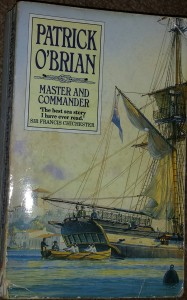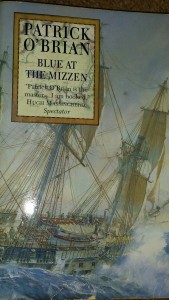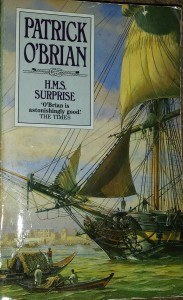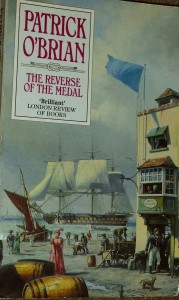Adventure stories have always been one of my guilty pleasures as an adult. Not so as a child when I devoured them unashamedly (and I sometimes re-read ‘The Three Musketeers’, or ‘The Riddle of the Sands’ even now, though usually when I’m ‘on holiday’). But it was only as an adult that I encountered the Royal Navy stories set during the wars with Napoleon.
 The Napoleonic wars provide the setting for what has been described as Britain’s ‘Wild West’ of the imagination. Bernard Cornwell made a mint out of a rifle company officer’s sometimes risqué adventures and Allan Mallinson began with Waterloo and his dragoon, Matthew Hervey. George Macdonald Fraser placed his anti-hero firmly, if antithetically, in this tradition.
The Napoleonic wars provide the setting for what has been described as Britain’s ‘Wild West’ of the imagination. Bernard Cornwell made a mint out of a rifle company officer’s sometimes risqué adventures and Allan Mallinson began with Waterloo and his dragoon, Matthew Hervey. George Macdonald Fraser placed his anti-hero firmly, if antithetically, in this tradition.
At sea, much earlier, there was C.S.Forrester and Hornblower. I was never drawn to any of these, seeing them as ‘boy’s own’ with the emphasis on the ‘boy’s’ (though I enjoyed the TV adaptation of Hornblower in the 90s). So, when I first read ‘Master and Commander’ by Patrick O’Brien, on the recommendation of a friend, I didn’t really know what to expect, but didn’t expect much. Derring do, swashing and buckling, sexy encounters with beautiful femmes fatale and dastardly enemies-on-your-own-side?
Well, there is some of that, though less than one might think. It was much more subtle and true to the details of the period than I had envisaged. Natural history and music play a large role, the latter a very strong and binding role in the friendship which is at the heart of this and all the other books which followed. The series begins, with ‘Master and Commander’ in 1800 and concludes, twenty books later, with ‘Blue at  the Mizzen’ after Waterloo, with the independence movements which sprang up in the former Spanish colonies in the wake of the fall of Napoleon.
the Mizzen’ after Waterloo, with the independence movements which sprang up in the former Spanish colonies in the wake of the fall of Napoleon.
In between, the ongoing Royal Naval career of Captain Jack Aubrey, brave and commanding at sea, but something less than clever ashore, forms the basis for the stories. He and his friend, the surgeon and intelligence agent, Stephen Maturin, encounter many aspects of early nineteenth century naval life – the corruption, political influence, the snobbery and prejudice reflective of society at the time and the downright hardship and violence. These are, of course, war stories and the depiction of the battles are very good and, wherever possible, based on accounts of actual engagements at sea.
On shore we meet all manner of events, a mini-social history of the time, with enclosure, elections, debtors prison and the scandalously unjust justice system featuring at different times. On a wider stage there is the cruel and vile convict colony of Botany Bay, the only recently independent U.S.A. (and its frighteningly efficient new volunteer Navy), all the shores of Europe and the newly established Freetown, Sierra Leone – the  base from which to engage the now illegal slaver ships. And there’s quite a lot about ships and sailing. I, like the Stephen Maturin character, engage with descriptions of rigging so full of good intentions, but my understanding is but little added to when they end. But it doesn’t matter, the descriptions add to the authenticity ( I’m certain that they’re accurate, mirroring Maturin’s certainty too ).
base from which to engage the now illegal slaver ships. And there’s quite a lot about ships and sailing. I, like the Stephen Maturin character, engage with descriptions of rigging so full of good intentions, but my understanding is but little added to when they end. But it doesn’t matter, the descriptions add to the authenticity ( I’m certain that they’re accurate, mirroring Maturin’s certainty too ).
O’Brien captures perfectly the speech and language of the time and is as astute, in his own way, as Austen, at portraying class-ridden, early nineteenth century English manners (though, unsurprisingly, he cannot duplicate her exquisite language and is wise not to try). Collectively the series creates a complete world. But it is the relationship between the two men at the centre of these stories which is what holds it all together. They encounter joy and disaster. They get rich, get poor again, fall in love, marry, have children, rise in their professions and live their lives, bound by affection each with the other. The characters are never less than fully rounded and their lifelong friendship sustains the spirit. Their disagreements, follies, joint successes and absurdities never fail to entertain and there is some stirring  derring-do as well.
derring-do as well.
The series is an ongoing pleasure. I re-read all the books every decade or so and still find them fresh and engaging. If you haven’t come across these books, I suggest that you give them a try.
If you enjoyed reading this book review you might like to try some others Novels Historical Short Stories


 RSS – Posts
RSS – Posts
Pingback: Meet Author J.J. Anderson – Mercedes Fox ~ Author